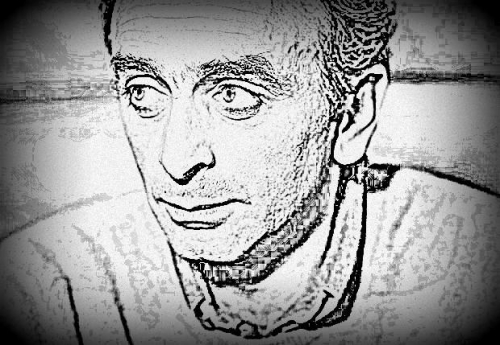mercredi, 25 mars 2015
Berlín se distancia de Washington sobre Ucrania
Por Diana Rojas
Ex: http://www.elespiadigital.com
El gobierno alemán está mostrando su creciente indignación por lo que considera como “una peligrosa propaganda” norteamericana para sabotear el cese el fuego en Ucrania. Los alemanes y otros europeos están preocupados por los intentos de, entre otros, el comandante supremo aliado de la OTAN en Europa, Philip Breadlove, y la secretaria adjunta del Departamento de Estado para Europa, Victoria Nuland, para exagerar la implicación rusa en el conflicto.
Responsables alemanes manifiestan, según el periódico norteamericano McClatchy, que los informes norteamericanos sobre la situación en Ucrania son totalmente inexactos o alegaciones sin confirmar. Cuando Breadlove afirmó que unos 40.000 soldados rusos se hallaban en la frontera preparando una invasión, fuentes de inteligencia europeas afirmaron que el número era de 20.000 y que no existía una intención de invadir.
Responsables europeos han rechazado también las afirmaciones de que unos 50 tanques rusos habían cruzado la frontera y señalaron que se trataba de un puñado de vehículos blindados y probablemente no militares en su origen.
Los informes alemanes señalan también una amplia diferencia en el número de rusos implicados en el conflicto del Donbass. Ellos estiman esta participación en unos 600, muy lejos de las cifras que ofrecen los comandantes norteamericanos de la OTAN y que rondan entre los 12.000 y los 20.000.
Sabotear esfuerzos de mediación alemanes
La revista alemana Der Spiegel se preguntó recientemente: “¿Quieren los norteamericanos sabotear los intentos de mediación europeos liderados por la canciller Merkel?” Esto en referencia al encuentro de Minsk entre Angela Merkel y el presidente francés, François Hollande, con el presidente ucraniano, Petro Porochenko, y su homólogo ruso, Vladimir Putin, para buscar un alto el fuego.
Esta disputa se produce en un momento en el que EEUU se dispone a enviar 75 millones de dólares en ayuda no letal a Ucrania, incluyendo 30 vehículos Humvee blindados y hasta 200 no blindados.
En las últimas semanas, la canciller alemana, Angela Merkel, parece frustrada con las propuestas que emanan del Congreso de EEUU y de partes de la Administración Obama para enviar armas a Ucrania, señalando que esto podría frustrar la oportunidad de hallar una solución diplomática y escalar la crisis.
Los responsables alemanes han advertido también que tras las visitas de políticos o militares estadounidenses a Kiev, los dirigentes ucranianos parecen más belicosos y optimistas sobre las perspectivas de que su Ejército pueda ganar el conflicto en el campo de batalla. “Nosotros tenemos luego que llevar a los ucranianos de vuelta a la mesa de negociaciones”, dijo un funcionario alemán.
Bob Lo, un experto sobre Rusia de la Chatham House de Londres, dijo que la disputa no es tanto sobre números sino sobre la forma en que el conflicto de Ucrania debe ser resuelto. Algunos responsables norteamericanos creen que sin una amenaza militar creíble las negociaciones de paz no tendrán éxito, mientras que los alemanes consideran que una amenaza de este tipo sólo serviría para escalar el conflicto.
Divergencia de intereses
Según el analista de la CIA Raymond McGovern se trata de la primera disputa seria entre Washington y Berlín desde la Segunda Guerra Mundial. Él señala que Alemania es capaz de enfrentarse políticamente a EEUU y tomar decisiones independientes por primera vez desde hace 70 años.
“Los alemanes han pasado de la adolescencia a la edad adulta y están dispuestos por primera vez en 70 años a hacer frente a EEUU y decirle: Nuestros intereses no coinciden con los vuestros. No queremos una guerra en Europa Central y tenemos la intención de evitarla”, indicó McGovern.
En realidad, esto demuestra la diferencia de intereses entre ambos países. La mitad del PIB alemán procede de las exportaciones y de ellas sólo el 40% va destinado ahora a la UE. Alemania busca y necesita los mercados de Asia, incluyendo países como Rusia, China e Irán, a los que ve como socios potenciales y no como rivales estratégicos, como hace EEUU.
Irritación norteamericana
Según Lo, numerosos funcionarios norteamericanos están insatisfechos de la política de Berlín y trabajan para hacer fracasar las iniciativas alemanes.
El ex director de la Agencia de Seguridad Nacional (NSA), Michael Hayden, declaró el 11 de marzo que la agencia nunca renunciará a espiar a los dirigentes alemanes sean cuales sean las consecuencias políticas. Hayden señala que la canciller alemana defiende ante todo los intereses alemanes y busca evitar una agravación de la situación en Ucrania, lo que Hayden parece lamentar.
Las revelaciones del ex agente de la CIA, Edward Snowden, sobre la actividad de los servicios secretos estadounidenses en Alemania provocaron un escándalo diplomático en el verano de 2013. La revista Der Spiegel señaló entonces que la NSA vigilaba 500 millones de conexiones telefónicas y de Internet en Alemania. En octubre de 2013, los medios anunciaron que Merkel estaba entre los espiados por los servicios de inteligencia estadounidenses. La canciller alemana ordenó entonces al servicio de inteligencia alemán BND y al Ministerio de Defensa reducir su cooperación con los estadounidenses.
00:05 Publié dans Actualité, Affaires européennes, Géopolitique | Lien permanent | Commentaires (0) | Tags : politique internationale, allemagne, états-unis, géopolitique, europe, affaires européennes |  |
|  del.icio.us |
del.icio.us |  |
|  Digg |
Digg | ![]() Facebook
Facebook
Porque Venezuela constituye una “inusual y extraordinaria amenaza al gobierno de los EEUU”
Ex: http://www.elespiadigital.com
Por Oglis Ramos*
Las acciones tomadas por Washington y ordenadas por su vocero principal y criminal internacional Barak Obama contra la República Bolivariana de Venezuela, son señales de temores del imperio ante la creciente influencia de la Unidad Bolivariana Latinoamericana, esta unidad liderada por Chávez y continuada por Maduro ha sembrado el terror en el seno mismo del imperialismo norteamericano; el cual ve a los líderes latinoamericanos como una amenaza a los intereses de las trasnacionales que son los verdaderos dueños del poder que ostenta La Casa Blanca; este terror se hace viral cada día más en las mentes retorcidas de los políticos estadounidenses, los cuales ven afectados los intereses que han mantenidos a lo largo de la historia de dominación norteamericana en Latinoamérica y que hoy los pueblos que fueron oprimidos le dijeron no al garrote yanqui y que, por vías crueles era aplicado induciendo y generando caos, sabotajes, intervenciones armadas y golpes militares en los países que se revelaban ante las pretensiones de las oligarquías internas y las mafias económicas internacionales; ejemplo de esto Guatemala y Chile ambos fueron atacados con la misma satanización internacional y el mismo modelo de sabotaje para luego instaurar represiones que desembocaron en miles de muertos y desaparecidos.
El gobierno norteamericano retoma las acciones del pasado contra la insurgencia de los pueblos latinoamericanos, desatando la más cruel campaña internacional de guerra mediática en contra de gobiernos legítimos y democráticos, los cuales alzando la bandera de sus libertadores y engrosando las más fieles ideas de liberación hoy enfrentan al mismo imperialismo de antaño.
La Revolución Bolivariana catalogada por el inquilino de la Casa Blanca como una amenaza a la seguridad estadounidense es sin duda una gran falacia que hoy el “premio nobel de la guerra” quiere hacer ver a la opinión pública mundial. La Revolución Bolivariana ha manifestado ser pacífica y respetuosa de los derechos humanos, en sus más de doce años, el proceso bolivariano ha sufrido los más bestiales ataques que van desde atentados terroristas, golpe de estado, sabotaje económico, asesinatos a líderes populares y militares de la fuerzas armadas, y a pesar de todas estas acciones coordinadas y dirigidas por las agencias de inteligencias que operan en Latinoamérica al servicio de la “Agencia de Criminales Internacionales” (CIA), ha mantenido su carácter de respeto e integridad por el valor humano. El escenario que se teje contra Venezuela es sin duda un plan para iniciar a desestabilizar toda la región y mantener así a raya cualquier intento de sublevarse ante los designios del poder económico imperial.
La pérdida de influencia del bloque económico imperial (BM, FMI, BID) en la gran mayoría de los países que integran el ALBA , CELAC y UNASUR es la primera señal y el primer golpe que recibe el imperialismo norteamericano, el cual cuenta con aliados muy cercanos a las fronteras venezolanas como los es Colombia, que a pesar de encontrarse integrando los organismos que nacieron de la rebeldía latinoamericana se camufla y juega frontalmente con políticas comerciales que se encuentran enmarcadas en el plan del Área de Libre Comercio para las Américas (ALCA) y dentro de su territorio pose inmensas bases militares que hace que el medio oriente sea solo un juego de niños; a esto le sumamos el creciente aumento de mercenarios en Perú el cual cedió su territorio no solo para amenazar a los países de la región, sino para demostrar el reacomodo militar y mercenario de la Casa Blanca en América Latina; tal y como lo ha venido haciendo en el continente europeo. Sin duda alguna estamos ante una escalada de amenazas a la paz suramericana que el gobierno de los EEUU quiere romper y sembrar en esta región lo que ha cosechado en el Medio Oriente.

Las acciones de Washington contra las naciones de América del Sur que se resisten a que su brazo sea torcido y quebrado van encaminada a imponer los designios tal y como lo hicieron en el pasado, solo que en este momento la integridad Suramericana se encuentra unificada bajo principios de hermandad inseparable, temor que siente el gobierno de Obama y sus amos trasnacionales al declarar una “emergencia nacional y una amenaza a la seguridad nacional de los Estados Unidos”; es por lo tanto la forma más clara de injerencia en contra de una República soberana. El vilipendio al que está siendo expuesta la República Bolivariana de Venezuela y su gobierno al decir Barak Obama de que no hay garantías de derechos humanos al decir “la violación de derechos humanos y abusos en respuesta a protestas antigubernamentales, los arrestos arbitrarios y detención de protestantes antigubernamentales, constituye una inusual y extraordinaria amenaza a la seguridad nacional y política internacional de los Estados Unidos de América, y por ende declaro una emergencia nacional para tratar con esta amenaza” queda claro que al premio nobel de la guerra hace a un lado los miles de muertos que causo en Libia, los miles de muertos que causo y sigue causando en Siria, los muchos miles de otros países solo con el afán de mantener una supremacía mundial; así mismo hace un lado el reciente informe de la Agencia de Criminales Internacionales (CIA) y sus actuaciones alrededor del mundo y esto sin olvidar las manifestaciones y su forma brutal y represiva como actúan asesinando y encarcelando a ciudadanos agobiados por actuaciones de su gobierno y por las crisis que ha causado: empobrecimiento de millones de norteamericanos. Por lo tanto estas amenazas de Venezuela contra los Estados Unidos se dan por los resultados que ha dado la Revolución Bolivariana y su mensaje de unidad a los pueblos oprimidos por el imperialismo norteamericano, mensajes que le causan terror y pesadillas; que en tan poco tiempo se halla avanzado en los países que ayer estaban bajo el yugo norteamericano y que hoy han demostrado avanzar en:
1- Lucha contra la pobreza y reducción de la misma en toda Latinoamérica
2- El carácter anti imperialista y democrático de los jóvenes organismos emergentes los cuales han desplazados a los viejos y arcaicos organismos de intervención ilegal (OEA, ONU)
3- La relación Rusia y china en el ámbito económico, tecnológico y militar lo cual causa preocupación y enojo a los EEUU además de quitarle una región geoestratégica.
4- La derrota de los tratados de libre comercio, los cuales luego de ser enterrada el ALCA, aun continua e nuestra América a través de países satélites entregados a los Estados Unidos con políticas claramente neoliberales (Colombia, Perú, Chile)
5- Independencia militar y tecnológica.
6- Desarrollo de inmensas reservas de petróleo sin el control de las principales trasnacionales guerreristas petroleras estadounidenses.
Entonces quien si se convierte en una amenaza para la América del Sur es y será los Estados Unidos, ya que con su afán de expansión y dominación pretende por el uso de las amenazas y de la fuerza arrodillar la voluntad inquebrantable de miles de millones de seres humanos que creen en que otro mundo es posible.
*Analista Venezolano
00:05 Publié dans Géopolitique | Lien permanent | Commentaires (0) | Tags : géopolitique, politique internationale, états-unis, venezuela, amérique du sud, amérique latine |  |
|  del.icio.us |
del.icio.us |  |
|  Digg |
Digg | ![]() Facebook
Facebook
Et si la France rejoignait l'Organisation de Shanghai?
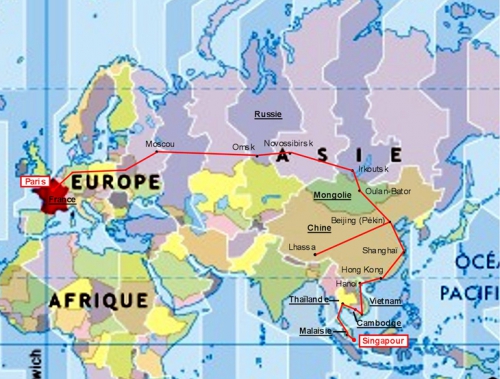
Et si la France rejoignait l'Organisation de Shanghai?
Dans un monde dont le centre de gravité se déplace de plus en plus rapidement vers l'Asie, et alors que la Chine est prête à assumer son statut de première puissance planétaire, la France pourrait prouver que l'Europe se souvient que son prolongement géographique naturel est l'Asie.
Environ 45 ans après la fin du cycle historique que constitua la « grande guerre mondiale de 30 ans » (1914-1945), la victoire de l'Amérique et du « monde libre » sur l'Union soviétique a sans doute été rendue possible par la diffusion globale de l'American way of life, très habilement diffusée via un outil de propagande redoutable et historiquement encore inégalé: Hollywood.
L'Amérique surfait aussi sur ses authentiques succès, et son image d'après-guerre était illustrée par un cliché plutôt juste: l'Américain du milieu des années 60 était l'homme le plus riche et le plus heureux du monde. Son mode de vie était envié et son avenir radieux semblait assuré, grâce au formidable essor économique de son pays. Si l'Amérique n'avait pas encore gagné militairement ni politiquement la guerre froide, elle avait déjà conquis les cœurs de la majorité des habitants de la planète, et pas seulement dans le monde occidental et européen.
La chute de l'Union soviétique semblait avoir ouvert un boulevard civilisationnel infini, qui aurait dû théoriquement permettre à la planète entière de devenir une copie de l'Amérique, au fur et à mesure que la domination de l'hyperpuissance se confirmait. Pourtant, le développement de cette politique de puissance et d'influence n'a pas toujours été très habile, et il a rencontré des difficultés imprévues.
Historiquement, cette hyper-extension de la puissance planétaire s'est pourtant accompagnée d'un affaiblissement de sa position dominante en tant que modèle. Elle n'a pu ni prévoir, ni empêcher l'extraordinaire essor de la Chine, et l'attentat du 11 septembre a bouleversé sa politique étrangère en l'engageant dans une lutte quasi-civilisationnelle contre l'islam radical.
Ce nouveau conflit de civilisations a brisé le rêve d'un monde dominé par le modèle américain. Comme symbole de la nouvelle Amérique, l'image du Californien heureux et souriant a laissé la place à l'image d'un Texan prétentieux et vindicatif appelant à utiliser l'armée américaine à tout bout de champ pour régler tous les problèmes de la planète.
La crise financière de 2008 a sans doute porté un coup fatal au « modèle américain pour le monde ». Derrière la façade reluisante des banques et du capitalisme triomphant, la crise des "subprimes" a dévoilé un monde d'usuriers et d'escroqueries à grande échelle, avec des faillites de banques et de fonds de retraite. Parallèlement à cette évolution, l'émergence de nouveaux acteurs régionaux s'accélère: le capitalisme libéral dont l'Amérique s'était servi pour dominer économiquement l'Ile-monde connaît de nouveaux développements dont le centre de gravité n'est plus en Amérique.
Pour la France, qui appartient à la civilisation européenne et actuellement au bloc politique, économique et militaire américano-centré, cette évolution pourrait être fondamentale et sans doute justifier que soit repensée notre politique extérieure.
Membre de l'Otan, possédant une forte communauté musulmane, la France est régulièrement impliquée, via des dispositifs techniques contraignants, aux velléités de la politique étrangère de Washington, surtout depuis qu'elle est redevenue un acteur de la coalition occidentale et de l'Otan.
Cette alliance d'un autre temps (celui de la guerre froide), dont la raison d'être est discutable puisque le pacte de Varsovie n'est plus, se cherche en permanence de nouveaux ennemis. Ceci permet à l'Amérique d'étendre de manière continue sa sphère d'influence et de domination économique, tout en mettant de plus en plus souvent ses membres et alliés en porte-à-faux avec un nombre croissant d'acteurs mondiaux.
Dans une logique gaullienne qui envisagerait un nouvel équilibre d'alliances tout en conservant une authentique souveraineté stratégique, la politique étrangère française pourrait envisager une voie diplomatique originale et se rapprocher de l'Organisation de la coopération de Shanghai (OCS).
Cette organisation, créée en 2001 par le tandem russo-chinois (déjà) et cinq autres membres fondateurs (Kazakhstan, Kirghizstan, Tadjikistan et Ouzbékistan) comprend à ce jour également cinq États observateurs (Afghanistan, Inde, Iran, Mongolie et Pakistan) et trois États partenaires de discussion: la Biélorussie, le Sri Lanka et la Turquie. Le sommet de l'OCS qui se tiendra cette année en Russie, au cœur de la région musulmane du Bachkortostan, pourrait voir l'Inde et le Pakistan obtenir le statut de membre complet, permettant ainsi à l'organisation de compter trois des BRIC.
Ce géant, assez méconnu en France, représente un cartel politique non-occidental de 37,5 millions de km² comprenant plus de 40% de la population mondiale et disposant de 20 % des ressources mondiales de pétrole, 38 % du gaz naturel, 40 % du charbon, et 50 % de l'uranium.
L'organisation, qui n'est pas une alliance militaire, se veut avant tout antiterroriste et axée sur la zone géographique eurasiatique, asiatique et pacifique. La France pourrait, en se rapprochant de l'OCS devenir la première puissance européenne membre stricto-sensu et ainsi conforter ses positions a trois niveaux différents:
1) Affirmer ses ambitions en Asie-Pacifique sans y laisser l'exclusivité à l'Amérique en tant que puissance occidentale.
2) Réitérer son statut de puissance continentale et euro-eurasiatique, prouvant ainsi que toutes les nations européennes ne sont pas mues par une unique dynamique atlantiste et tournée vers l'Ouest. Ce choix pourrait s'avérer doublement judicieux au moment où l'Eurasie semble se structurer, notamment avec l'Union eurasiatique.
3) Assurer une relation privilégiée avec la Russie au sein de ce dispositif et détruire ainsi la logique en cours qui tend à opposer, demain, ce bloc de Shanghai (russo-asiatique) au bloc de Washington (euro-américain), en évitant ainsi que ne réapparaisse une logique bipolaire similaire à celle que le monde a connu de 1945 à 1991.
Dans un monde dont le centre de gravité se déplace de plus en plus rapidement vers l'Asie, et alors que la Chine est prête à assumer son statut de première puissance planétaire, la France prouverait ainsi que l'Europe se souvient que son prolongement géographique naturel est l'Asie.
L'Hexagone a tout intérêt à en tenir compte pour « peser » dans le monde de demain, face aux géants qui écriront l'histoire au sein de la région Asie/Pacifique.
- Source : Alexandre Latsa
00:05 Publié dans Actualité, Géopolitique | Lien permanent | Commentaires (1) | Tags : france, brics, politique internationale, europe, affaires européennes, géopolitique, asie, affaires asiatiques, économie |  |
|  del.icio.us |
del.icio.us |  |
|  Digg |
Digg | ![]() Facebook
Facebook
Yémen: nouveau front de la guerre mondiale entre Chiites et Sunnites

Jean Bonnevey
Ex: http://metamag.fr
La vraie fausse guerre menée par la soi-disante coalition contre le califat d'Irak et de Syrie n' empêche pas les terroristes de Daech d’ouvrir de nouveaux fronts, contre les occidentaux et les pays musulmans réputés renégats en Tunisie, contre les chiites au Yémen. Un nouveau front de Daech contre l'avancée dans le monde arabe des chiites soutenus par l’Iran.
Depuis l’insurrection populaire de 2011, dans le sillage du Printemps arabe, qui a poussé au départ le président Ali Abdallah Saleh, le pouvoir central a été marginalisé par les Houthis et AQPA. Les Houthis, soupçonnés d’avoir le soutien de l’Iran, avaient déferlé en septembre 2014 sur Sanaa, puis étendu leur influence vers l’ouest et le centre du pays. Ils ont achevé de s’emparer de la capitale avec la prise le 20 janvier du palais présidentiel et le siège imposé aux résidences du président Hadi et d’autres responsables yéménites. Le 6 février, ils ont annoncé la dissolution du parlement et la mise en place d’un Conseil présidentiel, mais leurs tentatives d’étendre leur contrôle sur le pays bute sur la résistance d’AQPA et de tribus sunnites.
Le groupe Etat islamique a revendiqué un triple attentat suicide au Yémen contre des mosquées fréquentées par des chiites, qui a fait au moins 142 morts vendredi, l’une des attaques les plus sanglantes qu’ait connues le pays. Il s’agit de la première attaque revendiquée par l’EI au Yémen. Plus de 351 personnes ont été blessées dans ces attentats, a indiqué un responsable du Ministère de la santé.
Le pays s’enfonce davantage dans le chaos alimenté notamment par les Houthis chiites ayant pris la capitale Sanaa en janvier et les djihadistes sunnites d’AQPA, ennemis jurés mais tous deux hostiles au pouvoir du président Abd Rabbo Mansour Hadi. Dans le contexte yéménite, cette scission illustre le morcellement du pays, livré à l'arbitraire des clans et des groupes armés, et la sectarisation croissante des affrontements entre chiites et sunnites.
La branche de l'EI dans ce pays est née d'une scission d'Al-Qaida dans la péninsule Arabique (AQPA), la plus puissante franchise d'Al-Qaida. Elle ne s'était signalée jusqu'ici que par des attaques mineures de postes de contrôle de forces de sécurité ou de miliciens houthistes dans la région de Dhamar, à 100 km de la capitale. Des groupes issus d'AQPA avaient annoncé leur allégeance à l'EI entre novembre et février, dans un contexte de montée en puissance des milices houthistes dans le pays.
Ces deux groupes s'opposent notamment par leur vision du monde chiite : l'EI le considère comme l'ennemi prioritaire, quand AQPA privilégie les attaques contre le monde occidental et les régimes autoritaires arabes qu'il soutient. AQPA a théorisé un mode d'action terroriste en cellules opérationnelles relativement autonomes. Par ailleurs, l'EI a déjà revendiqué, par le même canal, l'attaque du Musée Bardo, à Tunis, mardi, sa première attaque de grande ampleur en Tunisie. Depuis plusieurs mois, l'organisation terroriste multiplie les appels aux groupes djihadistes à travers le monde pour qu'ils rejoignent sa « franchise ».
Il faut frapper au cœur le califat pour ruiner son attractivité mortifère et les Iraniens semblent les seuls capables de le faire, n'en déplaise à Israël qui malgré sa politique sécuritaire évite soigneusement le principal péril de la région, une erreur qui risque de lui être fatale. L’état sioniste a tout intérêt à participer à l'éradication de Daech avant que les palestiniens, à leur tour, ne rejoignent les sectaires terroristes musulmans.
00:05 Publié dans Actualité, Géopolitique | Lien permanent | Commentaires (0) | Tags : actualité, géopolitique, politique internationale, yémen, péninsule arabique, moyen orient, mer rouge, aden, monde arabe, monde arabo-musulman, chiites, sunnites, islam, houthis, al-qaeda |  |
|  del.icio.us |
del.icio.us |  |
|  Digg |
Digg | ![]() Facebook
Facebook
Le jour où la France se réveillera…

Les révolutions sont un leurre ; il suffit de constater que « les fauteuils ont simplement changé de derrières », disait Giono. Car les révolutions, de toutes les couleurs, sont des utopies, négations des réalités et du bon sens, issues des raisonnements d’idéologues dogmatiques, qui finissent immanquablement dans un bain de sang. C’est la Révolution française qui a inspiré nombre de celles qui lui ont succédé dans le monde, la plus importante étant la révolution russe. La chape de plomb sous laquelle le peuple russe a vécu pendant 77 ans (une vie d’homme) a explosé en 1991, comme le couvercle d’une Cocotte-Minute sous la pression spirituelle d’un peuple qui n’avait rien renié de ses attachements profonds à son sol, à son Dieu, à son Histoire, à sa culture, à ses traditions et à la mémoire de ses ancêtres. Le président Poutine, si critiqué par la bien-pensance occidentale, ne fait que (bien) gérer le réveil de son peuple ; en témoigne sa cote de popularité supérieure à 80 % – à comparer avec celle de notre président français.
L’esprit des Lumières, qui a inspiré la Révolution française, me semble tout entier être inscrit dans ces phrases de Montesquieu : « Aujourd’hui, nous recevons trois éducations différentes ou contraires : celle de nos pères, celle de nos maîtres, celle du monde. Ce qu’on nous dit dans la dernière renverse toutes les idées des premières. » Ce renversement des valeurs n’aura pas échappé à nos gouvernants « démocrates » et « républicains » pour réaliser combien il était facile de manipuler une masse d’individus plutôt que de diriger un peuple fier de ses origines, de sa terre et de ses traditions. Ce concept « lumineux » aura conduit à la mondialisation (consistant à concentrer les moyens de production pour en diminuer les coûts) qui n’aura, elle-même, abouti qu’à créer, à force de délocalisations pour sans cesse trouver une main-d’œuvre moins chère, un conglomérat de nouveaux esclaves se donnant à bas coût pour survivre. Le mondialisme, l’idéologie de la mondialisation, a pu ainsi instaurer le règne de la quantité et de l’uniformité, trouvant (inconsciemment ?) dans le « terrorisme » (concept vague qui dispense de désigner l’ennemi) un allié objectif pour détruire à bon compte les dernières résistances liées au monde de la tradition.
Les Français, dans ce mouvement de libération européenne initié par le peuple russe, ont-ils encore la volonté, la lucidité et le courage d’y trouver une place ? Sont-ils encore en mesure de revenir à des comportements de bon sens qui incluent de retrouver leur fierté, leur dignité, l’amour de leur terre, de leurs pères, de leurs frères ? De se remettre à l’œuvre pour redresser leur pays si profondément saccagé par des décennies de mensonges, de folies, de cupidité, de mépris, de veulerie ? Certains frémissements récents pourraient laisser penser que tout n’est pas perdu et que, un jour peut-être plus proche que nous le pensons, la France se réveillera.
00:05 Publié dans Actualité, Réflexions personnelles | Lien permanent | Commentaires (0) | Tags : actualité, france, réflexions personnelles |  |
|  del.icio.us |
del.icio.us |  |
|  Digg |
Digg | ![]() Facebook
Facebook
Het einde van (de) geschiedenis

Door: Dirk Rochtus
Ex: http://www.doorbraak.be
Het einde van (de) geschiedenis
Nee, dit is niet Fukuyama revisited. Dit gaat over linkse plannen om het vak geschiedenis af te schaffen.
Leraars geschiedenis in Duitsland maken zich zorgen. De regering van de Oost-Duitse deelstaat Brandenburg wil namelijk het vak geschiedenis in zijn huidige vorm afschaffen. De vakken geschiedenis, aardrijkskunde en politieke vorming zouden moeten versmelten tot het vak 'Gesellschaftslehre' (maatschappijleer). Ook fysica, chemie en biologie zouden onder de gemeenzame noemer 'Naturwissenschaften' vallen. De regering, die bestaat uit SPD (sociaaldemocraten) en 'Die Linke' (radicaal-links), meent dat het onderwijs meer moet worden afgestemd op de leefwereld van de scholieren. In plaats van in vakjes te denken moet er een overkoepelende leerinhoud komen, in plaats van een chronologische aanpak van het geschiedenisonderwijs moet er rond thema's gewerkt worden. De leraar zou bepaalde thema's kunnen uitdiepen in functie van de situatie in de klas en de competenties van de leerlingen.
De bedoeling is om de hervorming vanaf het schooljaar 2016-'17 te laten ingaan in Brandenburg. Volgens de christendemocratische oppositie (CDU) doelt het plan van de rood-rode regering erop het tekort aan leerkrachten 'statistisch' weg te cijferen. Als een leerkracht biologie immers ook onderwijs geeft in vakken waarvoor hij of zij niet opgeleid is, lost dat probleem zich immers vanzelf op, merkt de CDU in deze deelstaat schamper op. Maar het verzet tegen de hervormingen stoelt natuurlijk op een nog veel fundamentelere bezorgdheid. Als de chronologie uit het geschiedenisonderwijs wordt gebannen, bestaat het gevaar dat de leerling geen overzicht meer heeft en geen verbanden meer zal kunnen leggen. Een puur chronologische benadering van de geschiedenis kan tot datafetisjisme, een puur thematische tot een onderwijs à la carte leiden. De ideale aanpak is een evenwichtige koppeling van chronologie en thematiek. Het is ook een goede zaak dat er dwarsverbindingen worden gelegd tussen geschiedenis, aardrijkskunde en politieke vorming, maar al die vakken in één pot gooien heft de consistentie op die elk van hen eigen is.
Plannen zoals die van de rood-rode regering in Brandenburg hoeven niet te verwonderen. Ze passen in een tijdgeest waarin het geheugen niet meer 'getergd' mag worden met feitenkennis, waarin discuteren over thema's leuk is, en meer algemeen geschiedenisonderwijs als saai en irrelevant wordt beschouwd. Maar wanneer de geschiedenis niet meer gekend is, zal het woord van Karl Marx in de praktijk nog bewaarheid worden, namelijk dat ze zich herhaalt 'das eine Mal als Tragödie, das andere Mal als Farce' (uit: Der achtzehnte Brumaire des Louis Bonaparte, 1852). Overigens, Louis Bonaparte wie?
00:05 Publié dans Actualité, Ecole/Education, Histoire | Lien permanent | Commentaires (0) | Tags : école, éducation, histoire, actualité, allemagne |  |
|  del.icio.us |
del.icio.us |  |
|  Digg |
Digg | ![]() Facebook
Facebook
Heidegger on Nietzsche, Metaphysics, & Nihilism
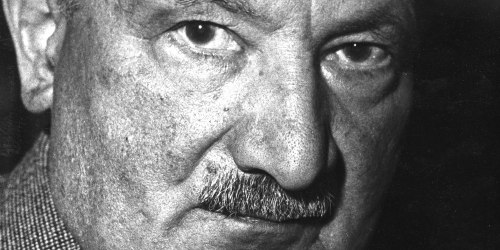
Heidegger on Nietzsche, Metaphysics, & Nihilism
By Greg Johnson
Ex: http://www.counter-currents.com
Heidegger’s central philosophical topic has a number of names: the sense (Sinn) or meaning of Being, the truth (Wahrheit) of Being, the clearing (Lichtung) of Being, the “It” that “gives” Being, and the “Ereignis” (“event” or “appropriation”) of Being, referring to the mutual belonging of man and Being.[1] All of these words refer to that-which-gives and that-which-takes-away different “epochs” in the history of Being, which are comprehensive, pervasive, and fundamental ways of interpreting the world and our place in it.
Heidegger’s topic is shrouded in mystery, for that-which-gives each epoch in the history of Being is hidden by the very epoch that it makes possible. This mystery is built right into the dual meanings of Heidegger’s names for his topic.
The word “Lichtung” refers both to Being (that which lights up beings) and also to the clearing that makes it possible for the light to illuminate beings—and the light attracts our attention to itself while leaving the clearing that makes it possible in darkness. The “it” that gives Being is hidden behind Being, its gift. Ereignis is the mutual belonging of man and Being, in which man in enthralled by the world opened up by the event and thus oblivious to the event itself. Heidegger even hears the mystery of Being in the word “epoch,” which refers both to the historical spans of particular dominant ways of interpreting the world, and, when heard in the Greek as “epoche,” refers to the withholding of that which grants the epochs, the giver that hides behind its gift.
Now we are in the position to begin to think through the connection that Heidegger draws between metaphysics and nihilism. Heidegger’s thesis is that nihilism is the consummation of Western metaphysics. To this end, I wish to comment on one of my favorite texts by Heidegger, the two lectures entitled “The Eternal Recurrence of the Same and the Will to Power.” These lectures beautifully epitomize Heidegger’s vast two-volume work on Nietzsche, and they gather together and display the unity of themes discussed by Heidegger over a period of more than 50 years.
Heidegger’s thesis is that “Nietzsche’s philosophy is the consummation of Western metaphysics.”[1] For Heidegger, Nietzsche’s philosophy represents the epitome of modern nihilism, the ultimate manifestation of the nihilistic impulse built into Western metaphysics from the very beginning. Heidegger’s thesis that Nietzsche is the last metaphysician of the West is a stunning thesis, a thesis very difficult to defend, for Nietzsche is widely regarded as the first post-metaphysical thinker, not the last and ultimate metaphysical thinker.
Traditional metaphysics is constructed around the dualisms of permanence and change and of appearance and reality. The permanent is identified with Being, which is said to be a reality that lies beyond the world of appearances, the world of change, the realm of becoming. Nietzsche seems to overcome these dualisms by collapsing the distinctions between permanence and change, appearance and reality, Being and becoming. Therefore, Nietzsche seems to go beyond metaphysics.
How, then, does Heidegger establish Nietzsche as the last metaphysician of the West? Another way of putting this question is: How does Heidegger establish that Nietzsche’s attempt to overcome metaphysics is a failure? What does Heidegger think that a genuine overcoming of metaphysics requires?
Nietzsche’s Metaphysics
When Heidegger uses the word “metaphysics” pejoratively, he refers to the metaphysics of presence: “These positions take the Being of beings as having been determined in the sense of permanence of presence” (p. 162). Another word for the metaphysics of presence in the Heidegger lexicon is “Platonism.” Platonism is a view that cannot necessarily be identified with Plato’s own views. Platonism, rather, is the pervasive interpretation of Plato’s views in the tradition. Platonism identifies Being with permanence as opposed to change, presence as opposed to absence, identity as opposed to difference.
The latter terms of these pairs—change, absence, difference—are identified with non-being. In the world around us, rest and motion, presence and absence, identity and difference are all mixed together.
Thus the Platonist concludes that this world is not the true world; it is not the realm of Being, but the realm of becoming, which is a mere blurred image or decayed manifestation of Being. Becoming is merely a veil of appearances which cloaks and hides that which is real, namely Being.
The Platonic realm of Being is identified as the place of forms or essences. The world of becoming is the world in which we find individual men, individual dogs, individual chairs, individual tables. All of these individuals come into being, change, and pass out of existence. The world of Being contains not individual men, but the essence of man, or “manhood.” It does not contain individual dogs, but the essence of dog, “doghood.”
Forms or essences, unlike individuals, do not come into being; they do not change; and they do not pass away. While particulars that become exist in time, forms of essences exist outside of time in eternity. Because particulars in time are infected with change, absence and difference, we cannot have certain knowledge of them; at best, we can have only tentative opinions about things in the world around us. We can have certain knowledge only of the forms or essences that make up the realm of Being.
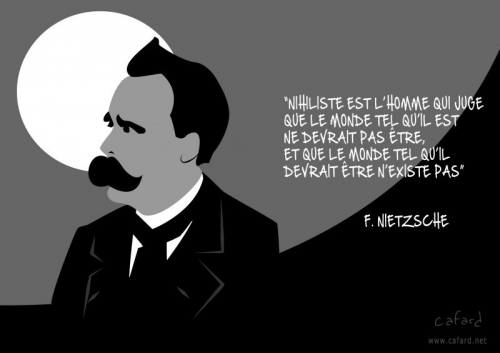
Heidegger holds that the metaphysics of presence—the interpretation of Being as presence—and also the Platonic distinction between the world of Being and the world of becoming is retained in Nietzsche’s allegedly post-metaphysical doctrines of the Will to Power and the Eternal Recurrence of the Same. What is the Will to Power? And what is the Eternal Recurrence of the Same?
Nietzsche called the ultimate constituent of the world Will to Power. This is a highly anthropomorphized name for something that is neither a will (for there is no agent behind it that wills); nor is it “to power” (for it is not directed toward the goal of power, or any other goal). Will to Power is Nietzsche’s name for chaos, which he conceived of as a virtual infinity of points of force charging and discharging entirely without pattern or purpose. Heidegger defines the “Will to Power” as “the essence of power itself. It consists in power’s overpowering, that is, its self-enhancement to the highest possible degree” (p. 163).
The Will to Power is the constant exercise of power as an end in itself.
The Will to Power makes possible the constant exercise of power by positing limits for itself and then exceeding them; Will to Power first freezes itself into particular forms and then overcomes and dissolves them.
The Will to Power is Nietzsche’s account of what the world is.
The Eternal Recurrence of the Same is a concept derived from the ancient Epicureans and Stoics. Both the Stoics and Epicureans believed that the cosmos is finite. The cosmos consists of matter and void, and there is only so much matter and so much void. Matter, however, is not fully inert. Matter has both inert and animate dimensions. Matter has the tendency to remain at rest or in motion, which the Epicureans represented by matter falling through the void. But matter also has a non-inert aspect that causes it to swerve from its fall or to move from rest to motion by its own power. The Epicureans represented this aspect of matter as the famous “clinamen” or “swerve” of the atoms. The Stoics represented this as divine logos, which following Heraclitus, they represented as fire. Matter, in short, is in some sense vital and animate; it is alive and ensouled. Matter’s vital principle allows order to form out of chaos. Matter’s inert dimension allows order to dissolve back into chaos.
Given a finite amount of matter and a finite void, given that matter has both a tendency to give rise to order and dissolve order, and given that time is infinite, the Epicureans and Stoics argued that the random play of chaos within a finite cosmos over an infinite amount of time not only gives rise to order, but gives rise to the same order an infinite number of times. Everything that is happening now has already happened an infinite number of times before and will happen an infinite number of times in the future. The Same events will Recur Eternally, hence the Eternal Recurrence of the Same. As Woody Allen once put it, “Eternal Recurrence of the Same. Does that mean I’ll have to sit through the Ice Capades again?” And the answer is: “Yes.” Not only will he have to sit through it again an infinite number of times, he already has sat through it an infinite number of times. It’s deja-vu all over again.
Nietzsche takes this argument over completely. The Will to Power corresponds precisely to the two aspects of matter discussed by the Epicureans and Stoics.
The animate aspect of matter that gives rise to form and organization corresponds to the Will to Power’s tendency to posit order.
The inert aspect of matter that causes form and organization to dissolve back into chaos corresponds to the Will to Power’s tendency to overpower and dissolve the very order that it posits.

Nietzsche holds that the Will to Power is finite and that time is infinite. Given the possibility of endlessly rearranging a finite Will to Power over an infinite amount of time, the same kinds of order will inevitably repeat themselves, and they will repeat themselves and infinite number of times: Eternal Recurrence of the Same.
Just as Will to Power is Nietzsche’s account of what the world is, The Eternal Recurrence of the Same is Nietzsche’s account of how the world is.
Nietzsche claims to have abolished metaphysics because he abolishes the dualism between appearance and reality, Being and becoming, presence and absence, identity and difference, etc. All of these pairs of opposites are found blended together in the Will to Power and the Eternal Recurrence of the Same. There is no realm of pure presence, pristine identity, total rest, and separate essences, lying behind the world that appears to us.
Heidegger’s critique of this claim is twofold. First, he argues that the basic elements of Platonism are still at work in Nietzsche. Second, he argues that Nietzsche really does not understand what it would take to overcome metaphysics.
How is Nietzsche a Metaphysician?
Heidegger argues that Nietzsche’s doctrines of Eternal Recurrence and Will to Power are metaphysical in two ways. First, the accounts of Eternal Recurrence and Will to Power still buy into the metaphysics of presence. As Heidegger puts it:
“Recurrence” thinks the permanentizing of what becomes, thinks it to the point where the becoming of what becomes is secured in the duration of its becoming. The “eternal” links the permanentizing of such constancy in the direction of its circling back into itself and forward toward itself. What becomes is not the unceasing otherness of an endlessly changing manifold. What becomes is the same itself, and that means the one and selfsame (the identical) that in each case is within the difference of the other. . . . Nietzsche’s thought thinks the constant permanentizing of the becoming of whatever becomes into the only kind of presence there is–the self-recapitulation of the identical. (pp. 164–65)
Elsewhere, Heidegger writes:
Will to Power may now be conceived of as the permanentizing of surpassment, that is of becoming; hence as a transformed determination of the guiding metaphysical projection. The Eternal Recurrence of the Same unfurls and displays its essence, so to speak, as the most constant permanentizing of the becoming of what is constant. (p. 167)
Will to Power and the Eternal Recurrence of the Same, in short, think Being in terms of presence too, by making becoming itself permanent, by making becoming recapitulate the identical, by making the motion of becoming circular, thus bringing a kind of eternity into time itself.
The second way in which Heidegger argues that Nietzsche is a metaphysician is somewhat more elusive and difficult. Heidegger writes on page 168:
From the outset, the Eternal Recurrence of the Same and Will to Power are grasped as fundamental determinations of beings as such and as a whole—Will to Power as the peculiar coinage of “what-being” . . . and Eternal Recurrence of the Same as the coinage of “that-being.”
Heidegger claims that this distinction is “co-extensive” with the basic distinction that defines and sustains metaphysics. “What-being” or “whatness” refers to the identity of beings. “What-being” or “thatness” refers to the existence of beings. To talk about the identity of a thing is to talk about what it is in contrast to the identity of different things, the things that it is not. When we talk about the existence of something, we are talking about the fact that it is, as opposed to the idea of its non-existence.
Now, in Platonism, the identity of a particular being is endowed by its form. A particular dog has its identity as a dog because it is related to the Form of dog, or “dogness.” A particular man has his identity as a man because he is related somehow to the essence of man, or “manhood.” A particular dog has his existence as a concrete individual dog because a bit of the material world has been informed by the essence of dog. So, for Platonism, the identity or whatness of a particular being is explained by its essence and its individual existence or thatness is explained by its materiality.
Heidegger holds that this Platonic distinction is present in the distinction between the Will to Power and the Eternal Recurrence of the Same. Will to Power names the whatness or identity of all beings. Therefore, it corresponds to the Platonic form. Eternal Recurrence names the thatness or existence of beings. Therefore, it corresponds to the instantiation of the Platonic Form in a bit of the spatio-temporal world. Will to Power is the principle of identity. Eternal Recurrence is the principle of existence. This dualism, Heidegger claims, is not overcome by Nietzsche, so Nietzsche does not overcome metaphysics.
Indeed, Heidegger claims that Nietzsche represents the culmination of metaphysics. To understand this, we must understand how, precisely, Nietzsche fails to overcome metaphysics. And to understand this, we need to know what Heidegger thinks a genuine overcoming of metaphysics would require.
What Constitutes a True Overcoming of Metaphysics?
Heidegger thinks that a genuine overcoming of metaphysics requires that we think his distinctive topic, the distinctive matter of his thinking: that which gives and that which takes away the different epochs of the history of Being. It requires that we think the Truth of being, the Meaning of Being, the Clearing of Being, the Event of Being, etc. Heidegger mentions his distinctive topic in a number of places in these lectures:
It first appears on page 164 (second paragraph):
What this unleashing of power to its essence is [i.e., that which grants the interpretation of Being as Will to Power], Nietzsche is unable to think. Nor can any metaphysics think it, inasmuch as metaphysics cannot put the matter [die Sache, the topic] into question.
It also appears on page 165 (second paragraph):
This “selfsame” [Being interpreted as Eternal Recurrence] is separated as by an abyss from the singularity of the unrepeatable enjoining of all that coheres. Out of that enjoining alone does the difference commence.
Here Heidegger contrasts Nietzsche’s metaphysics of history (which encloses becoming in the circle of Being through the idea of the eternal recurrence of the same) with his own view of the history of Being as a sequence of unrepeatable contingent singularities in which new epochs in the history of Being displace one another.
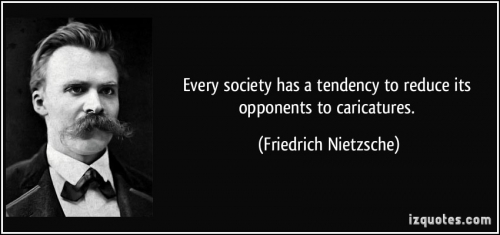
One can ask, however, if Heidegger himself does not ultimately subscribe to a kind of cyclical history, since he seems to believe that (1) the pre-Socratic Greek sense of Being as the dynamic interplay of presence and absence is correct, even though it overlooked the conditions of its own emergence, and (2) that it is possible to return to this correct interpretation of Being, either (a) reflectively, with an appreciation of its importance in the light of the subsequent tradition, or (b) naively, though the liquidation of the present civilization and a return to barbarism, which may be the meaning of Heidegger’s famous claim that “only a god can save us now,” meaning a return to naive belief.
Heidegger’s topic shows up again in the very next paragraph:
Thought concerning truth, in the sense of the essence of aletheia, whose essential advent sustains Being and allows it to be sheltered in its belonging to the commencement, is more remote than ever in this last projection of beingness.
Here aletheia refers to that which both grants a new epoch in the history of Being and shelters its advent in mystery.
There is also an extensive discussion of the topic from the bottom of page 166 throughout the entirety of page 167.
Heidegger claims that Nietzsche does not overcome metaphysics because the overcoming of metaphysics requires that one think that which grants different epochs in the history of Being and Nietzsche does not think this topic. Heidegger adds, furthermore, that Nietzsche not only fails to overcome metaphysics, he actually make this overcoming more difficult because he fosters the illusion that metaphysics is already overcome, thereby enforcing our oblivion to that which grants metaphysics, thereby making us less likely to think this topic and thus to effect a genuine overcoming of metaphysics. As Heidegger writes on 166:
Inadequate interrogation of the meaning of Nietzsche’s doctrine of Return, when viewed in terms of the history of metaphysics, shunts aside the most intrinsic need that is exhibited in the history of Western thought [i.e., the need to think that which grant metaphysics]. It thus confirms, by assisting those machinations that are oblivious to Being, the utter abandonment of Being.
It is at this point that we can understand why Heidegger thinks that Nietzsche is not only a metaphysician, but the culmination of metaphysics. Metaphysics thinks the Being of beings, but does not think the meaning of Being, the clearing of Being, etc. Nietzsche is the culmination of metaphysics because Nietzsche’s metaphysics not only fails to think that which grants Being, but actually makes this altogether impossible because it fosters the illusion that metaphysics has been finally overcome.
A further reason for regarding Nietzsche as the culmination of metaphysics can be appreciated by examining Heidegger’s definition of nihilism. Heidegger defines the modern technological age, the age of nihilism as “the age of consummate meaninglessness” (p. 174). Consummate meaninglessness is equivalent to the interpretation of Being in terms of man’s own subjective needs: Being as certainty; Being as intelligibility; Being as availability and deployability for human purposes. The world is meaningless because wherever we look, we only encounter projections of our own overweening subjectivity and will to power. The essence of modernity is the idea that everything can be understood and controlled.
This view of the world is made possible by our failure to think about what grants it, what makes it possible, the source of this epoch in the history of Being. Heidegger claims that we cannot understand the origin of the idea that we can understand everything. We cannot control the emergence of the idea that we can control everything. Trying to understand the origins of nihilism forces us to recognize that there is a mystery that cannot be explained or controlled. And this encounter with mystery is alone sufficient to break the spell that everything can be understood and controlled. It is thus a real overcoming of metaphysics and of its culmination in the nihilism of technological modernity.
Notes
1. See my essay “Heidegger’s Question Beyond Being,” http://www.counter-currents.com/2014/10/heideggers-question-beyond-being/ [4]
2. Martin Heidegger, Nietzsche, vol. III: The Will to Power as Knowledge and as Metaphysics, ed. David Farrell Krell, trans. Joan Stambaugh, David Farrell Krell, and Frank A. Capuzzi (New York: Harper and Row, 1987), p. 161.
Article printed from Counter-Currents Publishing: http://www.counter-currents.com
URL to article: http://www.counter-currents.com/2015/03/heidegger-on-nietzsche-metaphysics-and-nihilism/
URLs in this post:
[1] Image: http://www.counter-currents.com/wp-content/uploads/2015/03/bythesea.jpg
[2] Image: http://www.counter-currents.com/wp-content/uploads/2012/09/NietzscheSeated.jpg
[3] Image: http://www.counter-currents.com/wp-content/uploads/2014/09/heidegger-crop.jpg
[4] http://www.counter-currents.com/2014/10/heideggers-question-beyond-being/ : http://www.counter-currents.com/2014/10/heideggers-question-beyond-being/
00:05 Publié dans Philosophie | Lien permanent | Commentaires (0) | Tags : nietzsche, friedrich nietzsche, heidegger, martin heidegger, philosophie, métaphysique, nihilisme |  |
|  del.icio.us |
del.icio.us |  |
|  Digg |
Digg | ![]() Facebook
Facebook
Le rôle de la Russie comme puissance d’équilibre dans le monde
Le rôle de la Russie comme puissance d’équilibre dans le monde
La géopolitique comme vous le n'avez encore jamais découverte avec l'émission de Richard Haddad sur TV Libertés, Géopôles, qui en est à son second volet et consacrée cette fois-ci au rôle de la Russie comme puissance d’équilibre dans le monde.
Pour en débattre, deux invités :
Marc Rousset (diplômé H.E.C, Docteur ès Sciences Economiques, MBA Columbia University, AMP Harvard Business School, ayant occupé pendant 20 ans des fonctions de Directeur Général dans les groupes Aventis, Carrefour et Veolia)
et
Tancrède Besse (diplômé de Science Po, professeur d’histoire et aux préparations à Science Po, journaliste et entrepreneur).
00:05 Publié dans Actualité, Géopolitique | Lien permanent | Commentaires (0) | Tags : actualité, politique internationale, géopolitique, russie, europe, affaires européennes |  |
|  del.icio.us |
del.icio.us |  |
|  Digg |
Digg | ![]() Facebook
Facebook
Bismarck’s system of continental alliances
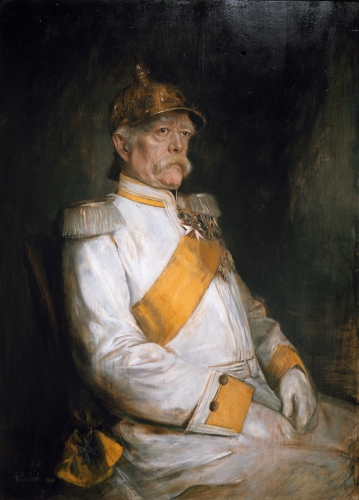
Bismarck’s system of continental alliances
By Srdja TRIFKOVIC (USA)
Ex: http://orientalreview.org
In an interview for the German news magazine Zuerst! (April 2015) Srdja Trifkovic considers the significance of Otto von Bismarck’s legacy, 200 years after his birth.
Dr. Trifkovic, how would Bismarck react if he could see today’s map of Europe?
Trifkovic: He would be initially shocked that the German eastern border now runs along the Oder and Neisse rivers. Otto von Bismarck was a true Prussian. In his view, cities such as Königsberg, Danzig or Breslau were more properly “German” than those in the Rhineland. His first impression therefore would be that Germany has “shifted” to the West, and that an important social and cultural aspect of his Germany has been lost. Once he’d overcome this initial shock, he would look at the map of Europe again in more detail. The considerable distance between Germany and Russia would probably amaze him. What in Bismarck’s time was the border between Germany and Russia is now a “Greater Poland” which did not exist at his time. And former provinces of the Russian Empire are now independent states: the three Baltic republics, Belarus and Ukraine. Bismarck would probably see this as an unwelcome “buffer zone” between Germany and Russia. He had always placed a great emphasis on a strong German-Russian alliance and would no doubt wonder how all this could happen. He would probably consider how to bring back to life such a continental partnership today. That would be a diplomatic challenge worthy of him: how to forge an alliance between Berlin and Moscow without the agitated smaller states in-between throwing their spanners into the works.
What would he advise Angela Merkel?
Trifkovic: He would probably tell her that even if you cannot have a close alliance with Russia, at least you should seek a better balance, i.e. more equidistant relations with Washington on the one hand and Moscow on the other. The concept of the Three Emperors’ League of 1881 is hardly possible today, but there are other options.
Security and the war in Ukraine would focus Bismarck’s attention…
Trifkovic: Merkel has adopted a very biased position on Ukraine, which Bismarck would have never done. He was always trying to cover his country from all flanks. In Ukraine we can clearly observe a crisis scenario made in Washington. Bismarck’s policy in the case of modern Ukraine would be for Berlin to act as a trusted and neutral arbiter of European politics, and not just as a trans-Atlantic outpost.
You said earlier that Germany since the time of Bismarck has shifted to the west. Do you mean this not only geographically?
Trifkovic: Even as a young man, as the Prussian envoy to the Bundestag in Frankfurt, Bismarck detested the predominantly western German liberals. At the same time, he later endeavored to ensure that Catholic Austria would be kept away from the nascent German Empire. Even at an early age we could discern Bismarck’s idea of Germany: a continental central power without strong Catholic elements and liberal ideas. He also knew that such a central European power must always be wary of the possibility of encirclement. Bismarck knew that he had to prevent France and Russia becoming partners.
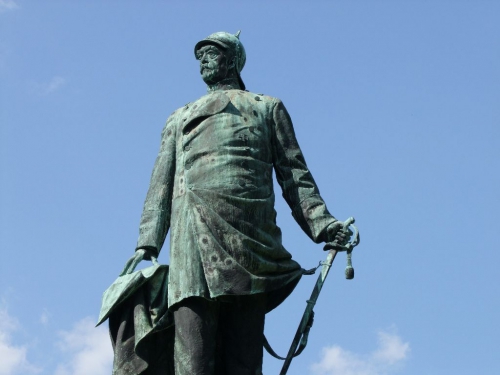
At all times the rapport with Russia appeared more important than that with France…
Trifkovic: Here is an oddity in Bismarck’s policy. After the 1870-71 war against France, the newly created German Empire annexed Alsace and Lorraine and thus ensured that there would be permanent tensions with a revanchist France. In real-political terms it should have been clear that any benefits of Alsace-Lorraine’s annexation would be outweighed by the disadvantages. French irredentism made her permanently inimical to Germany. No political overture to Paris was possible. The entire policy of the Third French Republic (1870-1940) was subsequently characterized by deep anti-German resentment.
As an American with Serb roots, you know East and West alike. Are there some differences in their approach to Otto von Bismarck?
Trifkovic: Apart from a few individuals in the scientific community, I am sorry to say that Otto von Bismarck is not adequately evaluated either in the West or in the East. On both sides, you will often encounter a flawed caricature of Bismarck as a bloodthirsty warmonger and nationalist who was ruthlessly pursuing Germany’s unification and whose path was paved with corpses. Nothing is further from the truth. The three wars that preceded unification were limited armed conflicts with clear and limited aims. Bismarck ended two of those wars without unnecessarily humiliating the defeated foe; France was an exception. The war against Austria in 1866 in particular showed that Bismarck’s only concern was to secure Prussia’s supremacy in German affairs. Only a few years later he concluded an alliance with Austria-Hungary. Let me repeat: Bismarck was not a brutal warmonger; he was a brilliant political realist who quickly grasped his advantages and his opponents’ weaknesses. Therein lies an irony that today’s moralists find difficult to explain: Bismarck was a cold calculator and his decisions were rarely subjected to ethical criteria – but the result of his Realpolitik was a relatively stable German state which under Bismarck’s chancellorship managed Europe’s adjustment to its rise without armed conflicts. Between 1871 and 1890, the German Empire was on the whole a stabilizing factor in Europe. During the Berlin Congress to end the Balkan crisis in 1878, Bismarck effectively presented himself as an honest broker, respected by all of Europe. However, with Bismarck’s departure in 1890, this period of the relaxation of European tensions and Germany’s stabilizing influence was over.
What changed after 1890 for Europe?
Trifkovic: After Bismarck there was no longer a steadfastly reliable Chancellor and the German policy lost its sureness of touch. Suddenly the neurotic spirit of the young Emperor, Wilhelm II, started prevailing, a feverish “we have-to-do-something” atmosphere. The massive naval program was initiated, while the Reinsurance Treaty with Russia was not renewed – and it was the cornerstone of Bismarck’s scenario to prevent a war in Europe. Initially the Czarist Empire urged the renewal of the bilateral agreement with Berlin. The Kaiser took the view that the Reich could be better protected by its own military buildup than through alliances. And suddenly, Bismarck’s nightmare came true. Since Russia abruptly found herself with no international allies, and the German-Russian relations cooled more and more, it approached France and arranged the military convention of 1892. In 1894 a firm alliance was signed. It was not ideological. The liberal, Masonic, secular and republican France was allied with the Orthodox Christian, deeply conservative, autocratic Russian Empire. And Germany was in the middle. Bismarck always dreaded this sort of two-front alliance, which laid the foundations of the blocs of belligerent powers in World War I. You can see some current parallels in the policy shift of 1890.
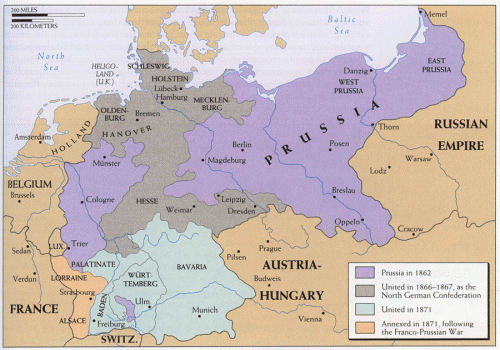
In what way?
Trifkovic: The often neurotic policy of Berlin after Bismarck’s dismissal reminds one of the aggressive style of the likes of Victoria Nuland and John McCain today. Looking at Germany from 1890 to 1914, one sees striking parallels with today’s U.S. neoconservatives. The obsession with Russia as the enemy is one similarity. After Bismarck’s dismissal, Russia was depicted in the media of the German Empire in darkest colors, as backward, aggressive and dangerous. If we take today’s Western mainstream media – including those in Germany – this image has just been reinforced: the dangerous, backward, and aggressive Putin Empire.
Bismarck was not a German Neocon?
Trifkovic: (laughs) No, he was the exact opposite! He was not a dreamer, nor an ideologue. He did not want to go out into the world to bring Germanic blessings to others, if necessary by the force of arms. Bismarck was always a down-to-earth Prussian landowner. While Britain as a naval power opened up trading posts and founded colonies all over the world, and British garrisons were stationed all over in India or Africa, Bismarck’s Germany was created as a classic land-based continental power. I would even suggest that Bismarck himself had an aversion to the sea. Very reluctantly he was persuaded in the 1880’s to agree to the acquisition of the first protectorates for the German Reich. On the whole, Germany’s colonial program was economically questionable. What Germany was left with in the 1880’s was what the other major colonial powers had left behind, especially the United Kingdom. Bismarck knew that, and he saw that all the important straits and strategic points, such as the Cape of Good Hope, were under British control. In Germany the colonial question was mostly about “prestige” and “credibility” – and Bismarck the master politician had no time at all for such reasoning.
Bismarck also had a clear position on the Balkans. In 1876, he said in a speech that the German Empire in the Balkans had no interest “which would be worth the healthy bones of a single Pomeranian grenadier.” This seems to have changed, however: Today German soldiers are in Kosovo, the Federal Republic of Germany was the first country to recognize the independence of Slovenia and Croatia from Yugoslavia in 1991…
Trifkovic: Otto von Bismarck was always weary of tying Germany’s fate to that of Austria-Hungary. His decision to steer clear of the conflicts in the Balkans was sound. After Bismarck’s dismissal Germany saw the rise of anti-Russian and anti-Serbian propagandistic discourse which emulated that in Vienna. Incidentally, there is another quote by Bismarck which was truly prophetic. “Europe today is a powder keg and the leaders are like men smoking in an arsenal,” he warned. “A single spark will set off an explosion that will consume us all. I cannot tell you when that explosion will occur, but I can tell you where. Some damned foolish thing in the Balkans will set it off.” In relation to Serbia there are parallels to the current situation in Europe. In 1903 a dynastic change in Belgrade ended Austria-Hungary’s previous decisive influence in the small neighboring country. The house of Karadjordjevic oriented Serbia to the great Slav brother, to Russia. Vienna tried to stop that by subjecting Serbia to economic and political pressure. But out of this so-called “tariff war” Serbia actually emerged strengthened. We recognize the parallels to Russia today: one can compare the Vienna tariff war against Belgrade with the sanctions against Russia. Sanctions force a country to diversify its economy, thus making it more resistant. In Serbia it worked well a hundred years ago, in Russia it may work now. When Austria-Hungary annexed Bosnia and Herzegovina in 1908, there was a serious emergency and only Germany taking sides with Vienna ended the Bosnian crisis. In the end Germany picked up the tab: After the outbreak of World War I Austrian-Hungarian troops failed to defeat Serbia. They needed military assistance from Germany. Prussian Field Marshal August von Mackensen finally defeated Serbia, and proved to be a truly chivalrous opponent: “In the Serbs I have encountered the bravest soldiers of the Balkans,” he wrote in his diary. Later, in 1916, Mackensen erected a monument to the fallen Serbs in Belgrade with the inscription “Here lie the Serbian heroes.”
When we in Germany think of Bismarck today, we come back time and over again to the relationship with Russia … [Trifkovic: Indeed!] … Is it possible to summarize the relations as follows: If Germany and Russia get along, it is a blessing for Europe; if we go to war, the whole continent lies in ruins?
Trifkovic: The only ones who are chronically terrified of a German-Russian understanding are invariably the maritime powers. In the 19th century the British tried to prevent the rise of an emerging superpower on the continent, such as a German-Russian alliance. Looking at the British Empire and its naval bases, one is struck by how the Eurasian heartland was effectively surrounded. Halford Mackinder formulated it memorably: “Who rules East Europe commands the Heartland; who rules the Heartland commands the World-Island; who rules the World-Island commands the world.” Dutch-American geo-strategist Nicholas J. Spykman developed Mackinder’s theory further. It is the “Rimland” – which surrounds the heartland – that is the key to controlling the land mass. Spykman is considered as a forerunner of the U.S. containment policy after the war.
Spykman was focused especially on the communist Soviet Union, not so much on Germany…
Trifkovic: He was concerned with controlling the “Heartland” quite independently of the dominant land power’s ideology. Spykman wrote in early 1943 that the Soviet Union from the Urals to the North Sea, from an American perspective, was no less unpleasant than Germany from the North Sea to the Urals. A continental power in Eurasia had to be curtailed or at least fragmented – that is exactly the continuity of the global maritime power’s strategy to this day.
On sanctions against Russia, and U.S.-EU disputes, Germany is in the middle. What would Chancellor Bismarck do today?
Trifkovic: He would swiftly end the sanctions regime against Russia because he’d see that Germany was paying a steep price for no tangible benefit. He would also seek to reduce the excessive U.S. influence on German policymaking. But Europe does not necessarily need a new Bismarck: as recently as 50 years ago we had several European politicians of stature and integrity. People like Charles de Gaulle or Konrad Adenauer had more character and substance than any of the current EU politicians. Europe in its current situation is in great need of them.
Source: Chronicles
00:05 Publié dans Entretiens, Histoire | Lien permanent | Commentaires (0) | Tags : allemagne, entretien, histoire, 19ème siècle, bismarck, europe, affaires européennes |  |
|  del.icio.us |
del.icio.us |  |
|  Digg |
Digg | ![]() Facebook
Facebook
Le visage d'Eric Zemmour
par Julien Rochedy
Ex: http://www.rochedy.fr
Il faut regarder le visage d’Eric Zemmour de ces derniers jours pour comprendre que quelque chose s’est passé. Que quelque chose est passé. Sur lui, et aussi, par lui. Je me rappelle son visage lors de ses premières années en tant que star médiatique : Zemmour parvenait, en toutes circonstances, à conserver son air bon enfant, ses yeux rieurs et complices, y compris avec d’infâmes invités à qui il venait juste d’assener deux ou trois vérités. Zemmour, c’était le gentil mec, le sympathique, le seul qui pouvait faire rimer réactionnaire avec débonnaire, celui qui n’était pas d’accord avec la guimauve de la pensée télévisuelle, mais qui terminait toujours en riant, comme si, au final, tout cela n’était pas si grave. On a beaucoup glosé sur la judéité de Zemmour qui seule, semblait-il, le protégeait dans l’espace médiatique, compte tenu de tout ce qu’il pouvait y dire. On a beaucoup entendu que si Zemmour avait été un catholique blond aux yeux bleus d’un mètre quatre vingt, il eut été catalogué comme "nazi" et aussitôt exclu du PAF. Je crois que l’essentiel n’était pas là ; sa longévité, il la tenait plutôt de son côté accommodant, de son air bienveillant : il la tenait de son visage souriant.
N’importe quel personnage issu de son école de pensée (gaullo-bonapartiste, en somme : patriote), en face d’un BHL ou d’un Edwy Plenel, à l’écoute des mensonges des uns ou des naïvetés des autres, eut fini par sévèrement froncer les sourcils, par hausser la ton, par croiser les bras ou au contraire les déplier pour atteindre le nez de ceux d’en face. Pas Zemmour. Depuis 2003 qu’on le voit à la télévision jusqu’à aujourd’hui, jamais il ne fut grave, ou très rarement. On obtient tout avec une arme à la main disait Al Capone ; à la télévision, on obtient tout avec un sourire plaisant. Zemmour s’est battu des années contre la pensée moderne avec la meilleure des armes modernes, une arme féminine qui plus est : la gentillesse.
Grâce à elle, il est passé par toutes les mailles du filet, on l’a gardé, on l’a fait intervenir, on ne l’a pas vu venir, et au final, il les a tous battus. La société a changé, la gauche morale s’est écroulée – quelque chose s’est passé – Zemmour a triomphé chez les téléspectateurs. Et c’est alors que quelque chose s’est aussi passé sur le visage d’Eric Zemmour. Je le regarde depuis plus d’une semaine, tandis qu’il écume les plateaux télé pour la promotion de son livre Le suicide Français. Son visage s’est durci subitement, il ne sourit plus, ou moins, et il affronte avec une gravité nouvelle les attaques de tous les prêtres médiatiques qui sentent bien que c’est encore par aménité que Zemmour a parlé de suicide plutôt que de meurtre, sans quoi ils eussent tous été sur le banc des accusés. Le visage d’Eric Zemmour s’est transformé. Il parle désormais sans légèreté de la mort de ce qu’il aime passionnément, la France, son pays, son enfance, et ses rêves de maréchaux napoléoniens éclaboussant de gloire la grande nation. Il sait que tout cela est mort et n’a plus envie de le dire en riant pour faire plaisir aux Ruquier ou aux Domenach. Il parle désormais d’autorité, car il sait que les Français – je veux dire : ceux qu’il reste – sont avec lui et partagent, sinon ses vues, au moins son désarroi. Zemmour n’a plus à jouer désormais, il est devenu grave, plus sombre, plus solennel ; médiatiquement, il n’a plus de visage bon enfant ; c’est un homme maintenant. D’une certaine manière, ce visage est l’heuristique de l’époque dans laquelle nous sommes entrés, car le temps de la dérision est passé, révolu par la réalité dure et violente ; le tragique reprend peu à peu ses droits sur l’Histoire et le temps des hommes revient.
Zemmour, sans conteste, en est un.
00:05 Publié dans Actualité, Affaires européennes, Réflexions personnelles | Lien permanent | Commentaires (0) | Tags : eric zemmour, france, actualité, europe, affaires européennes, réflexions personnelles |  |
|  del.icio.us |
del.icio.us |  |
|  Digg |
Digg | ![]() Facebook
Facebook





